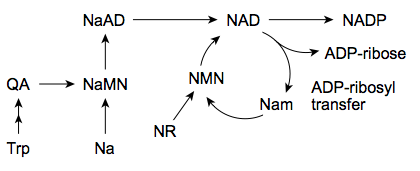10th World Congress on Polyphenols Applications: Porto Polyphenols 2016
Effects of marginal dietary vitamin B3 levels on metabolic flexibility and anti-oxidant response in mice exposed to a high fat diet.
Maria, HEGEMAN (1), Wenbiao, SHI (1), Jing, TANG (1), Dorien, VAN DARTEL (1), Hans, SWARTS (1), Jaap, KEIJER (1)
1: Wageningen University, Wageningen, the Netherlands, Netherlands
"Abstract
Objective: Nicotinamide adenine dinucleotide (NAD+) preserves cellular redox state and basal energy metabolism. Maintenance of NAD+ levels is dependent on dietary vitamin B3 levels, which is a NAD+ precursor. Although it is evident that severe vitamin B3 deficiency causes disease, little is known on the physiological consequences of marginal vitamin B3 levels. Therefore, the effects of marginal dietary vitamin B3 levels on metabolic flexibility and anti-oxidant response were studied.
Methods: Adult male mice were exposed to a HFD containing 5 or 30 mg nicotinamide riboside (NR) per kg diet. Body weight, lean mass, fat mass and feed intake were measured weekly. After 14 weeks, metabolic flexibility was assessed with a fasting and refeeding challenge using indirect calorimetry. After 15 weeks, the anti-oxidant response was determined in epididymal white adipose tissue.
Results: Whole body physiological parameters were not affected by dietary NR. Upon a fasting and refeeding challenge, the delta respiratory exchange ratio (ΔRER) was higher when comparing 30 to 5 mg/kg NR. Expression levels of anti-oxidant genes were enhanced in the 30 mg/kg group compared to the 5 mg/kg group.
Conclusion: Current results suggest that 30 mg/kg NR increases metabolic flexibility and anti-oxidant levels compared to 5 mg/kg NR."

































 This topic is locked
This topic is locked



























